
***
Gladiator: 2001

***
A Beautiful Mind: 2002
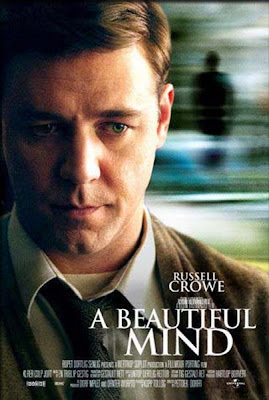
***
Chicago: 2003

***
The Lord of the Rings: The Return of the King: 2004
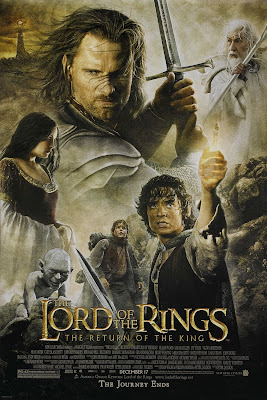
*** Million Dollar Baby: 2005

***
Crash: 2006
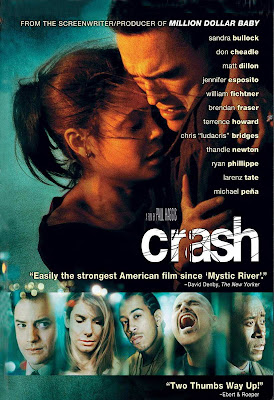
***
The Departed: 2007
What do these films have in common?
American Beauty: A man narrates the film, has a midlife crisis, and attempts to seduce and/or rape a potentially underage high school student.
Gladiator: A man in captivity avenges the murder of his wife and son by murdering their murderer.
A Beautiful Mind: A man at the height of his genius suffers from schizophrenia.
Chicago: A singing and dancing man attempts to save singing and dancing female inmates from death row.
The Lord of the Rings: Men go on a quest.
Million Dollar Baby: A man narrates the film, telling the story of his friend’s attempt to train and manage a determined female boxer.
Crash: A cast of characters—male and female—illustrates our society’s inability to distinguish between racism and prejudice.
The Departed: Men violently kill one another.
No Country For Old Men: A hired hitman goes on a killing spree with a captive bolt pistol.
Slumdog Millionaire: A man participates in a televised game-show, thinking it will help him find his long-lost love.
I’m interested to see how the 2010 Academy Awards Ceremony will choose to honor this year’s films, especially now that they’ve bumped up the number of Best Picture nominees to ten instead of five. With the amount of women-centered and/or directed films this year—Julie & Julia, Precious: Based on the Novel Push by Sapphire, Bright Star, Amelia, and The Hurt Locker, to name a few—I hope women will feel some of the Academy love. Don’t forget to check back in February for analysis of the ten Best Picture nominees!
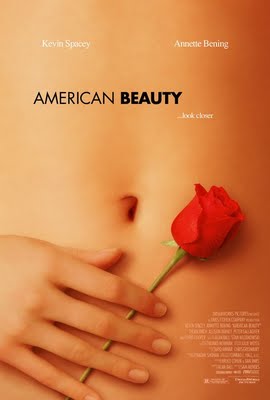

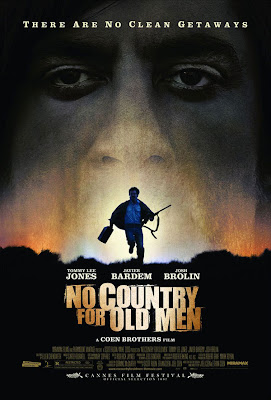

I do feel that both Million Dollar Baby (which I have not seen, so I could be wrong) and Chicago could be considered more woman-centric than man-narrated. However, I note that in both movies a male character is central to the plot. I’m sure a lot of these new films will get an award. I remain cynical, though- I think the Best Picture Award will go to another film that has more ‘universal human appeal’, because women are supposed to identify with men, but men are demeaned by/unable to relate to women.
We can hope, though.
Hi Sabertooth,
I agree about Million Dollar Baby and Chicago; they can certainly be read that way. The issues I have with reading those particular films as women-centric though, is that the women feel ultimately exploited to me.
In Chicago, the exploitation occurs both physically and in other ways: the women are portrayed as conniving and manipulative liars, and I believe the film validates those ideas about women in the end; they get out of their respective death row sentences by throwing everyone they know under the bus.
In Million Dollar Baby, I couldn’t relate to the story of Swank’s character without noting that it depended completely upon her loyalty to Eastwood’s character. One could read it as a film about the eventual development of their father/daughter relationship, but the narration by Morgan Freeman (who narrates the film by reading a letter he wrote to Eastwood’s estranged daughter) suggests we’re meant to identify with Eastwood’s plight. Swank’s character is just the tool used to take us there.
I agree that both of those films at least portray female characters who aren’t merely one-dimensional sidekicks, and that certainly makes me happy.
Thanks for reading and commenting!
I agree with your comment that men are central to the plots of both Chicago and Million Dollar Baby.
One reason why I love Chicago so much (and Cabaret) is that they illustrate what women go through to survive *and* keep a semblance of independence in a crushing patriarchy. Kander & Ebb have a touching empathy with the women in their musicals that I found very meaningful (during some horrible times in my life, I will admit). It does play into the “Women are conniving and selfish” narrative, but there are deeper subtexts that I think makes Chicago a tragic story. I think that’s common in both Chicago and Cabaret. They seem to be playful sexy romps but underneath there is some pretty damning and scary things being said about both human nature and the way we treat those on the lower rungs on the Societal Hierarchy Ladder.
So, I’m not disagreeing with you. I just really love talking about Kander & Ebb musicals. LOL!